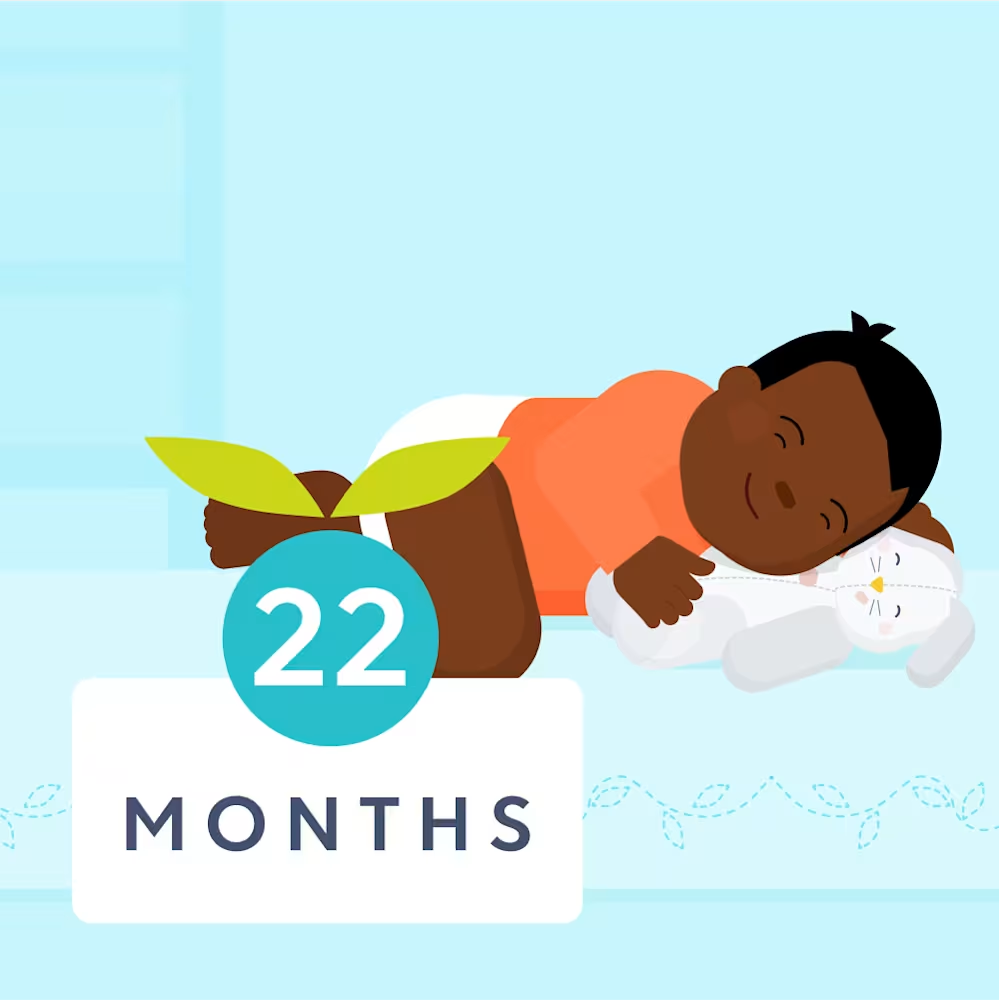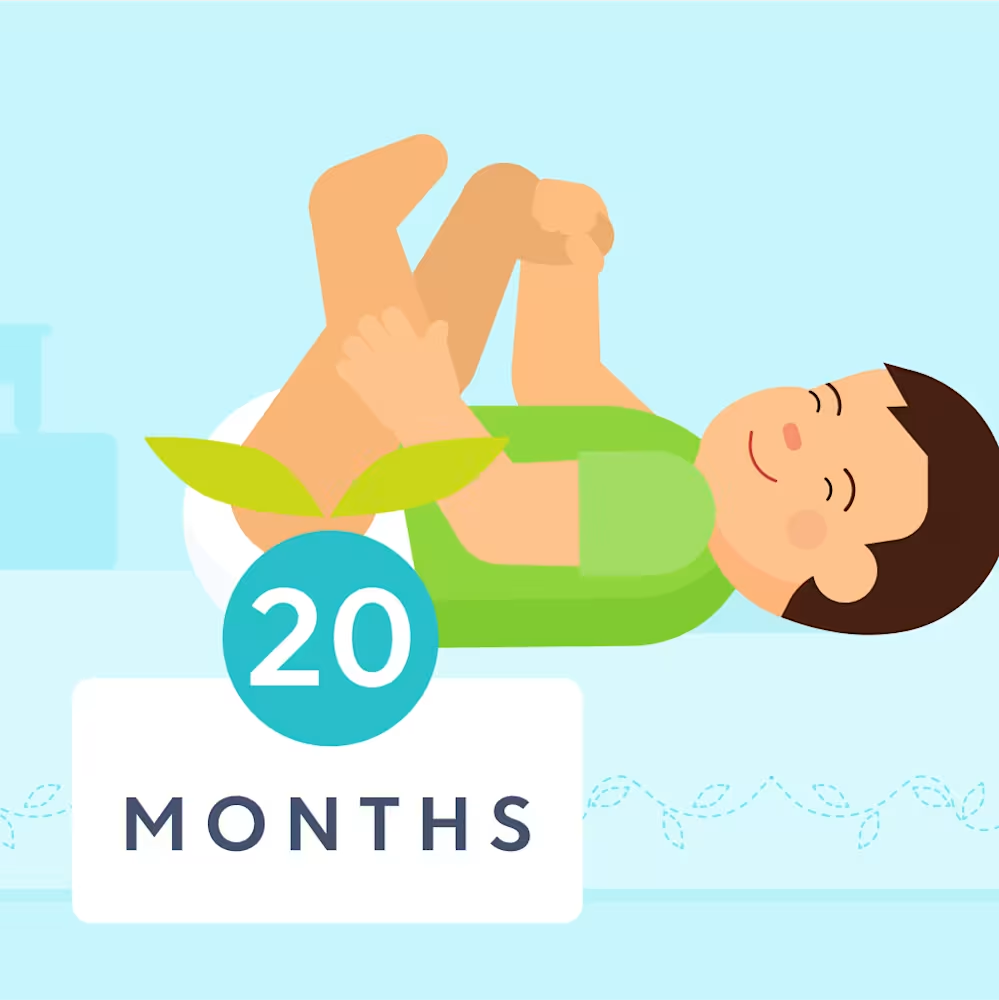21 month old sleep schedule: Bedtime and nap schedule
Updated Dec 15, 2025

At 21 months, kiddos are typically busy! Toddlers are often physically active and their language may be taking off as well — many say 50 - 100 words at this age []. With so much development occurring, it’s important for your child (and you!) to have some downtime during the day to rest and recharge. Well-timed naps can also cut down on and eliminate overtiredness at bedtime.
Curious about an ideal 21 month old sleep schedule? Read on to learn more about your child’s sleep needs, including recommended naptime and bedtime at this age.
How much should a 21 month old sleep?
We recommend aiming for about 12.5 hours of total sleep per 24 hours so that your child is sufficiently rested. This often breaks down to around 10 - 12 hours of nighttime sleep and 1.5 - 2.5 hours of daytime sleep during their midday nap. Keep in mind your child may do best with more or less sleep than these recommendations and that’s OK! In general, also keeping an eye on their mood and energy levels can help you figure out if they’re getting enough sleep.
Here's a quick overview of what you may expect when it comes to 21 month olds and sleep. Note that these figures are averages and should be used as guidelines.
Top sleep tip for 21 month olds
If your 21 month old is waking up for long stretches at night, they might be getting too much daytime sleep or not building enough sleep pressure before bed. Most toddlers this age do best with one nap lasting 1.5 – 2.5 hours and wake windows of about 5 – 5.75 hours. If split nights keep happening, try shortening the nap or shifting bedtime later by 15 minutes every few days until they’re tired enough to sleep through.
Sample 21 month old sleep schedule

Note: Sleep needs vary by child and this chart should be viewed as an example.
Morning rise: 7:00 AM
Wake window before nap: 5 hours
Nap: 12:15 PM - 2:15 PM (2 hour nap)
Get ready for bed: 7:15 PM
Wake window before bedtime: 5.75 hours
Asleep: 8:00 PM
Naptime schedule for a 21 month old
Most 21 month olds do best with a set rather than one that shifts based on wake-up time. Aiming for a consistent nap, around 5 - 5.5 hours after their usual morning wake-up, helps keep sleep on track. Every kid is different, so a little flexibility is fine, but a predictable schedule makes sleep easier for everyone! The one exception? If you're working on early waking, you may need to stretch awake time to 6+ hours temporarily.
How long should a 21 month old nap?
We recommend aiming for around 1.5 - 2.5 hours of daytime sleep for 21 month olds. If your child regularly skips their nap or has short naps, leading to chronic overtiredness, you may want to move bedtime a bit earlier to help reduce the effects of overtiredness — just be sure not to put them down before 6:00 PM to avoid a cycle of early morning wake-ups.
How many naps for a 21 month old?
Toddlers at 21 months usually take one nap per day that lasts somewhere around 1.5 - 2.5 hours. If they’re consistently fighting daytime sleep, encourage them to still spend time in their crib during naptime. Even resting quietly can help them recharge. Sometimes they’ll surprise you by actually falling asleep!
1-nap schedule
1-nap schedule with short nap/early bedtime
Bedtime for a 21 month old
Although toddlers love their independence, they thrive on routine. Having a consistent bedtime routine helps your child know what to expect and helps them feel confident and in control. The average bedtime routine at this age is typically 30 - 45 minutes long.
A typical routine consists of activities like a bath, brushing teeth, putting on pajamas, saying goodnight to everyone, reading a book or two, turning on, and singing lullabies. When setting bedtime, factor in the time your child needs to fall asleep (about 10 – 20 minutes) plus the length of their bedtime routine. If your toddler insists on doing things independently (which often takes twice as long), be sure to allow extra time for those tasks too!
If it’s taking longer than 10 - 20 minutes for your child to fall asleep, consider adjusting the awake period before bed to ensure they’re tired enough but not overtired. If they take too long to wind down and fall asleep, try extending their last wake window slightly. If they seem overtired or struggle to settle, consider shortening it. Other reasons for long sleep onset may include an inconsistent routine, an uncomfortable sleep environment, separation anxiety, parental presence at bedtime, or recent schedule changes.
What time should a 21 month old go to bed?
Most 21 month olds need at least 11 hours of sleep per night. For many families, this means bedtime is between 6:00 - 8:00 PM.
Why does my 21 month old keep waking up at night crying?
It’s not uncommon for children to go through a phase of waking up overnight at around 21 months. There’s a lot going on at this age that may contribute to a phase of bumpy sleep, like:
Seeking independence
Mastering milestones
Teething
Separation anxiety
Illness
Parent-led sleep associations
If you’re looking for more sleep support, consider submitting for a personalized, step-by-step Sleep Plan via .
Is there a sleep regression at 21 months?
can happen at any age — there isn’t a specific “21 month sleep regression” that you can mark off on the calendar. If your kiddo is newly resisting or skipping naps, waking early, and/or waking up more at night at this age, we’d call this a sleep regression. Common contributing factors that may lead to a period of challenging sleep at this age include separation anxiety, developmental milestones, teething, and illness.
Can my 21 month old sleep with a pacifier?
If you’re concerned about the long-term effects of pacifier use (beyond age 2–4) and its potential impact on teeth alignment and mouth development, you’re not alone. However, this usually isn’t a concern until permanent teeth start coming in. The AAP suggests most kids won't need treatment until age 5, although some experts recommend addressing the habit around age 3 [].
Can a 21 month old sleep on their stomach or side?
By 21 months, it’s safe for your toddler to sleep on their stomach or side if they roll into that position on their own and can roll both ways. Allowing them to find a comfortable sleep position is normal at this age.
Can I sleep train a 21 month old?
Yes, can be used on toddlers at 21 months. When thinking about sleep training, choose the method that fits your child and parenting preferences. Not all are “cry it out” methods. Some are gradual and take a bit longer to “work,” while others produce faster results and may have more tears upfront. However, this is typically short-lived.
What are the developmental milestones for a 21 month old?
At , your kiddo may be using simple phrases, sorting shapes and colors, and learning to kick a ball. Keep in mind that all toddlers are unique, and there's a spectrum of normal milestones at this age. However, if you are concerned about your child’s growth or developmental delays, contact their healthcare provider.
Here’s what your child may be trying around 21 months:
Uses simple phrases (18 - 24 months)
Runs
Stands on tiptoes
Climbs on low furniture
Kicks large ball
Flips switches on and off
Scribbles
Sorts shapes and colors
Stacks 5+ or more small blocks or toys
Takes toys apart and puts them back together
Uses at least 50 words (19 - 21 months)
Consistently imitates new words (19 - 21 months)
Understands simple pronouns (me, you, my) (19 - 21 months)
Does a 21 month old need to eat during the night?
Most 21 month olds don’t need to eat overnight. However, if you suspect they’re waking in the middle of the night (or very early in the morning) because they’re hungry, consider when they’re eating dinner. If your family eats on the early side, consider offering a pre-bed snack or moving mealtime a bit later. Shifting their eating schedule may help ensure they sleep through the night and until a desirable wake-up time.
Takeaway
We recommend aiming for about 12.5 hours of total sleep per 24 hours so that your child is sufficiently rested. This often breaks down to around 10 - 12 hours of nighttime sleep and 1.5 - 2.5 hours of daytime sleep during their midday nap.
Although toddlers love their independence, they thrive on routine. Having a consistent bedtime routine helps your child know what to expect and helps them feel confident and in control. The average bedtime routine at this age is typically 30 - 45 minutes long.
If it’s taking longer than 10 - 20 minutes for your child to fall asleep, consider adjusting the awake period before bed to ensure they’re tired enough but not overtired.
Most 21 month olds need at least 11 hours of sleep per night. For many families, this means bedtime is between 6:00 - 8:00 PM.
If you're curious about what lies ahead in the coming month, glimpse into the future to see what you might experience once your baby is on a . Also check out a to see how far your little one has come.
Share article:
Note: The content on this site is for informational purposes only and should not replace medical advice from your doctor, pediatrician, or medical professional. If you have questions or concerns, you should contact a medical professional.
2 Sources
Share article:










